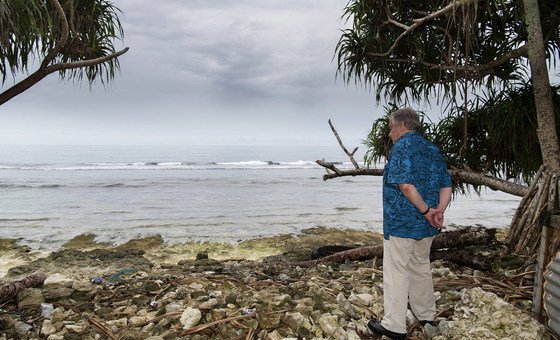Pacific Island Nations declared a climate crisis on Tuesday at the Pacific Islands Development Forum (PIDF) Leaders' Summit hosted by Fiji, urging countries around the world to achieve the Paris climate agreement’s goal of keeping global temperatures from rising more than 1.5 degrees Celsius above pre-industrial levels.
The leaders called on all countries to end fossil fuel subsidies, phase out coal projects, and invest heavily in renewable energy projects in an accompanying document. They also called on developed countries to fund climate adaptation efforts around the world.
The declaration was signed by leaders from Fiji, Kiribati, Nauru, Micronesia, the Marshall Islands, the Solomon Islands, Vanuatu, Timor Leste, and Tonga. The leaders acknowledged the fundamental unfairness of their position — while island nations have contributed the least to climate change, they stand to be the most affected by its consequences.
“We express deep concern about the lack of comprehension, ambition, or commitment shown by developed nations of the world regarding the impending grave consequences that the current and ongoing climate crisis poses for vulnerable Pacific Small Island Developing States (PSIDS), which contribute negligible amounts of greenhouse gases (GHGs) to this human-caused global problem,” the signatories wrote.
Pacific Island Nations are on the frontlines of climate change. Many have already lost landmass to rising sea levels and coastal erosion. Others have faced obliterating mega-storms.
The island archipelago of Tuvalu is facing sea level rise four times greater than the global average. The Marshall Islands, meanwhile, are rapidly becoming uninhabitable because of saltwater intrusion. Thousands of islands in the region, for that matter, could become uninhabitable by 2050 and contingency plans to permanently evacuate have been drawn up in recent years.
Across the region, an estimated 1.7 million people could be displaced by 2050.

Read More: Marshall Islands Pledges to Reach Zero Greenhouse Emissions by 2050
In many cases, small island nations don’t have the resources to sufficiently adapt to the threats of climate change. Building resilient buildings and roads, sea walls, water and sanitation systems, and more, are often prohibitively expensive.
That’s why the Paris climate agreement specifically calls on wealthy nations to fund adaptation efforts around the world.
Through the Green Climate Fund, the United Nations has committed $5.2 billion to 111 projects in developing nations.
In the joint climate crisis declaration, the signatories call for these efforts to be urgently escalated.
Read More: 7 Key Places That Have Declared Climate Emergencies
“This visionary declaration is a testament to the will of the Pacific people who have moved their politicians to show committed actions in confronting the climate crisis,” said Fenton Lutunatabua, regional managing director of the environmental advocacy group 350.org in the Pacific, in a statement.
“The collective futures of Pacific peoples depends on us being able to pushback against the fossil fuel industry fueling this climate crisis, and toward equitable and just solutions centered on people — this is what is at the heart of this important international statement,” he added.